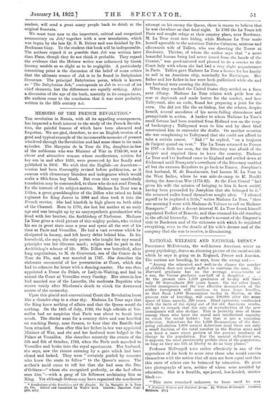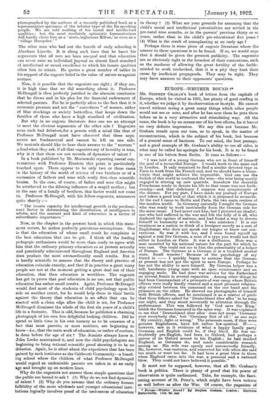NATIONAL WELFARE AND NATIONAL DECAY.* PROFESSOR MeDoneaea, the well-known American
writer on group psychology, draws an alarming picture of the racial suicide which he says is going on in England, France and America. The nations are breeding, he says, from the wrong end :-
"Among the educated and well-to-do classes the number of children does not nearly suffice to continue the race. The Harvard graduate has on the average seven-tenths of a son, the Vassar graduate one-half of a daughter. . . . At the present rate 1,000 graduates of to-day will havo only 50 descendants 200 years hence. On the other hand, recent immigrants and the less effective descendants of the earlier immigrants still continuo to have largo families, so that from 1,000 Roumanians to-day in Boston, at the present rate of breeding, will come 100,000 after the same space of time, namely, 200 years. Blind optimists, confronted with the facts of the dying out of the old American stocks„, are apt to remark that the rate of reproduction of the new- immigrants will also decline. This is probably true of those among them who have the moral and intellectual capacity to climb the social ladder : but that is not a consoling reflection. Substitute for the 1,000 Roumanians of the fore- going calculation 1,000 mental defectives (and these are only a small fraction of the total number in the Boston area) and you have a more exact picture of the present tendency of change in the population. For the mental defectives are, it appears, the most persistently prolific class of the population, so long as they are left at liberty to do as they please."
Professor McDougall tries rather effectively in one of the appendices of his book to score over those who would console themselves with the notion that all men are born equal and that this state of affairs can be balanced by education. He gives two photographs of men, neither of whom were moulded by education. One is a horrible, ape-jawed, low-headed, sinister black:— "This man remained unknown to fame until he was • National Welfare and National Decay. By Willian3 Arepougall- London 1tethuon. L6x1
photographed by the authors of a recently published book as a representative specimen of the inferior type of the Ila-speaking people. We are told nothing of his moral and intellectual qualities ; but the most resolutely optimistic humanitarians will hardly claim him as a mute, inglorious Milton,' or even as a village Hampden.' "
The other man who had not the benefit of early schooling is Abraham Lincoln. It is along such lines that he bases his arguments that all men are born unequal and that education can never raise an individual beyond an almost fixed standard of intellectual or moral excellOnee to which his innate qualities allow him to attain. He quotes a great number of tables in his support. of the eugenic belief in the value of nature as against nurture.
Now, it is possible that the eugenists are right ; if they are, it is high time that we did something about it. Professor McDougall is then perfectly justified in the alarmist conclusion that ho draws and in his plea for the financial endowment of selected parents. For he is perfectly alive to the fact that it is economic pressure and not the " cussedness " of women, either of blue stockings or society butterflies, that keeps down the families of those who have a high standard of civilization.
But why in no eugenic literature does one see an attempt to meet the obvious arguments of the other side ? Eugenists seem such bad debaters, for a person with a mind like that of Professor McDougall must have observed that these argu- ments are fundamental and cannot be left on one side. We neutrals should like to hear their answer to the " nurture " school when they ask, if all that eugenists say of heredity is true, why is it that there are not records of dynasties of talent ?
In a book published by Mr. Mosisowaki reporting casual con- versations with Professor Einstein this point is particularly touched upon. There appear to be only two or three cases in the history of the world of science of two brothers or of a succession of fathers and sons with really first-class scientific brains. In the case, of course, of father and sons this might be attributed to the diluting influence of a stupid mother ; but in the case of a family of brothers, this factor would not come in. Professor McDougall, with his fellow-eugenists, announces quite shortly :-
" The innate capacity for intellectual growth is the predomi- nant factor in determining the distribution of intelligence in adults, and the amount and kind of education is a factor of subordinate importance."
Now, in the chapter in the present book in which this state- ment occurs, ho makes perfectly gratuitous assumptions. One is that the education of whose small result ho complains is the best education that can be got. I think all the leading pedagogic enthusiasts would be more than ready to agree with him that the ordinary primary education as at present actually and practically administered throughout England and America does produce the most extraordinarily small results. But it is hardly scientific to assume that the theory and practice of education coincide exactly, and that if in practice a great many people are not at the moment getting a great deal out of their education, that then education is worthless. The eugenist
has got to prove that good education is no use, not that public education has rather small results. Again, Professor McDougall would find most of the students of child psychology upon his side on another count, for he would help there in their battle against the theory that education is an affair that can be started with a clean edge after the child is six, for Professor McDougall dismisses tho whole of the first six years of a child's
life in a footnote. This is odd, because he publishes a charming photograph of his own five delightful looking children. Did he spend so little time in his own nursery as to be unaware of a fact that most parents, or most mothers, are beginning to know—i.e., that the main work of education, or rather of nurture, Is done before the age of six ? The Jesuists always knew it. John Locke maintained it, and now the child psychologists are beenning to bring rational scientific proof showing it to be no delusion. Again, he is silent about the experience that has been gained by such institutes as the Caldecott Community—a board- ing school where the children of what Professor McDougall
Wald regard as undesirable parents are taken in at an early age and brought up on modern lines.
Why do the eugenists not answer these simple questions that the public are bound to ask ? (1) Why do we not find dynasties of talent ? (2) Why do you assume that the ordinary human fallibility of the more wholesale and younger educational insti tutions logically involves proof of the uselessness of education
in theory ? (3) What are your grounds for assuming that the child's moral and intellectual potentialities are settled in the pm-natal nine months, or in the parents' previous thirty or so years, rather than in the child's pre-educational five years ? (4) What is the result of transplanting at an early age ?
Perhaps there is some piece of eugenic literature where the answer to these questions is to be found. If so, we would urge that it should be given the greatest publicity. The eugenists are so obviously right in the broadest of their contentions, such as the madness of allowing the great fertility of the feeble- minded to work unchecked, that it is a pity they hurt their cause by inefficient propaganda. They may be right. They may have answers to their opponents' questions.



































 Previous page
Previous page